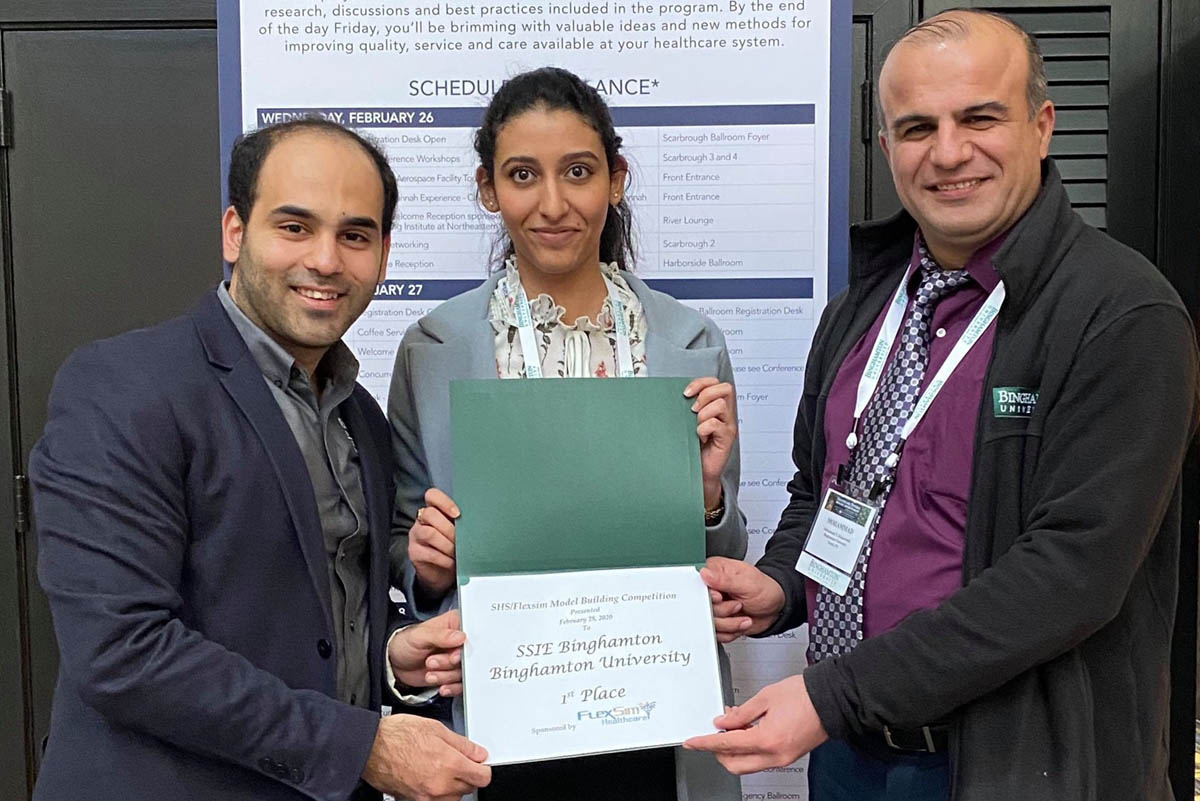Binghamton students take home top honors in engineering simulation competitions
Students put the skills they develop in the classroom to the test

Despite the COVID-19 disruptions that marked 2020, Binghamton University students won top honors at several international simulation modeling competitions.
This streak carried into 2021, as the Institute of Industrial & Systems Engineers (IISE)/Rockwell Arena simulation competition selected a group of Binghamton industrial and systems engineering students to receive third place.
These competitions provide a unique opportunity for students to put the skills they develop in the classroom to the test. Groups of undergraduate and graduate students from the Department of Systems Science and Industrial Engineering (SSIE) at the Thomas J. Watson College of Engineering and Applied Science come together each year for a variety of modeling and simulation competitions where teams are given a problem based on real-world issues that they must solve in eight to nine weeks, depending on the competition.
SSIE students routinely have participated in three competitions: the Society for Health Systems FlexSim Simulation Competition at the Healthcare Systems Process Improvement (HSPI) conference; the International Simio Systems Student Simulation Competition; and the Rockwell Arena Automation Undergraduate Simulation Competition at the Institute of Industrial and Systems Engineers (IISE) annual conference.
After teams register for the competitions, organizers release the problem that each team must solve. The teams spend time working to address each year’s issue, which often reflects current concerns that professionals in the systems engineering field are facing. Students have to rely on each other for support while devising solutions and running simulations to see if their work solves the problem in the most efficient way possible.
For example, the FlexSim Simulation Competition, which accepts both graduate and undergraduate students, recently asked students to redesign the physical layout of a hospital floor to ensure proper social distancing while maintaining an effective flow for doctors and nurses to deliver patient care.
Binghamton students have faced stiff competition in recent years, with the international Simio Systems Student Simulation Competition including more than 600 teams from 23 countries. The IISE/Rockwell Arena Automation Undergraduate Simulation Competition has had over 50 teams from more than two dozen countries as well. This level of play makes the victories all the more meaningful.
“Each year, we see the number of teams that participate in the competitions increasing,” said Daehan Won, an assistant professor in Watson’s SSIE Department and the IISE/Rockwell Arena Simulation Competition advisor.
“Most of these simulation competitions are team-based. It’s helpful for our students to increase skills such as communication, inclusive collaboration, and many other factors.”
Students are required to improve their technical competency as future engineers, taking necessary actions such as evaluating various assumptions, conducting numerical analyses, doing mathematical modeling to figure out the optimal options, and making a conclusion with visualization tools. Also, the teams are required to construct comprehensive reports and slide presentation for anonymous reviewers made up of experts from various fields.
Since Binghamton began participating in the competitions, both student and departmental interest has only grown. Several professors, like Won, have acted as faculty advisors for the student teams. For the professors teaching the courses these students draw from, they get to see their students excel at an even more elevated level.
“We discuss the case study, brainstorm methodologies and come up with alternatives to consider in the solution,” Won said. “We have more engagement with the students during these competitions, and as a result we get to know them better, which has been a very rewarding experience.”
SSIE Professor Sangwon Yoon, who advises simulation competition teams and is a faculty advisor of the Binghamton IISE student chapter, said, “The SSIE department offers several simulation courses, including undergraduate and graduate levels. If students do not have a chance to utilize the entire suite of software functionalities [in the course], the IISE student chapter has been hosting additional workshops to help students be more prepared for the competitions. These additional workshops provide a chance to broaden their technical capabilities.
“We also have a lot of support from the SSIE department. Special thanks to the department chair, Professor Mohammad Khasawneh, who has been providing all the resources that the competition teams need to have. We are very happy to see our students compete in these international competitions and win.”
The number of faculty advisors have increased, and even students who have participated in previous years’ competitions have provided assistance and advice to those teams that are currently enrolled. These competitions have created a space for students to bond and learn outside the classroom, to great success.
“We started doing the competitions about four years ago,” Yoon said. “The first year, we didn’t get in! Since then, we’ve gotten second, third and — last year — first place in all three major simulation competitions.”
It definitely doesn’t hurt that, due to these successes, Binghamton students have won more than $24,000 in cash prizes. Not only are these students bringing home the gold and adding personal accomplishments to their resumés, they’re also making sure that Binghamton and its SSIE Department remain a force to be reckoned with at these competitions and increase overall Bearcat pride.
“We are very, very, very, very, very proud of our students,” Yoon said. “Can you write that? Five times?”
Won added: “Our students work very hard and are very passionate about the challenge of new problems. We are glad to see their efforts paid off.”
Khasawneh echoes their sentiments.
“We are very glad to see an increasing number of students successfully participating in such international competitions year after year and achieving great results,” he said.
“Our students and faculty are a source of pride, and their efforts and achievements reflect well on the department as a whole, raising the bar for future students. Binghamton is now a key player in industrial and systems engineering, and our growth in both quantity and quality of applicants suggest this trend will continue. As our dean would say, the best is yet to come.”
